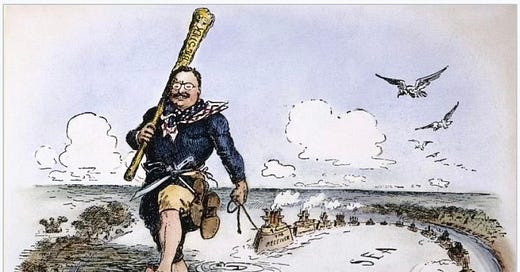It’s time to consider whether President Donald Trump has talked himself into a corner.
He’s been making a lot of noise about Russia, China, Ukraine, Iran, Gaza, and more, but what progress have we seen?
Trump promised to end the Russian-Ukraine war on his “first day” in office. Give him some room for his usual exaggeration, but that first day was a long time ago. And now Russian dictator Vladimir Putin is playing Trump, well, like Trump thought he was going to play Putin. And everyone else.
Trump finally showed that reality has settled in. In a rare display of puzzlement and frustration, he called Putin “crazy:”
I don't know what the hell happened to Putin. I've known him a long time, always gotten along with him but he's sending rockets into cities and killing people, and I don't like it at all."
Also:
“What Vladimir Putin doesn’t realize is that if it weren’t for me, lots of really bad things would have already happened to Russia, and I mean REALLY BAD. He’s playing with fire!”
So, like what? Trump said he would “absolutely” consider more sanctions on Russia, and maybe he will as soon as today.
From the beginning, going back to his first run for office, he seemed like he was buddies with Putin. His approach to Russian hegemony always seemed muted. So much so, that the Democrats’ “Russia, Russia, Russian” fake campaign against Trump was a bit easier to believe.
One can asked: Did Trump truly think that he could end the war because he “got along” so well with Putin? Did Trump really think that the force of his personality could do it? And a better question: Was he sucked in by Putin?
Putin thinks that Ukraine historically belongs to Russia. Yet how could he think that the Ukrainians would welcome the Russians when Soviet dictator Joesph Stalin carried out one of the world’s worst genocides by starving to death up to 20 million Ukrainians.
If Trump has been outfoxed, personal insult makes him at his most dangerous. But Trump must now put aside personal insult and get down to the real issue: Can the United States and Europe contain Putin’s designs of restoring the Russian Empire? What are America’s interests in all this?
You might want to pursue this questions by reading the Wall Street Journal editorial, “Trump’s Foreign Policy Crossroads. The President faces key moments of decision on U.S. adversaries.” It asks:
President Trump’s foreign policy has been coasting so far on his verbal threats and public cajoling. But he’ll soon face moments of decision on U.S. adversaries that will echo throughout his second term and could determine his legacy.
The editorial raises similar questions about how should Trump deal with Iran and China.
Here’s what puzzles me: Trump ran as an isolationist in foreign affairs. Lots of people voted for him because he promised no foreign entanglements. No more wars; no sticking our nose in where it doesn’t belong. No wasting our resources on mooching outsiders when we have so much to do at home.
That was then. And this is now when we aren’t hearing a peep out of the isolationist wing of the Republican party. With all of Trump’s foreign interventions, you might even mistake him for a neocon (neoconservative) whom Trump roundly condemned for their foreign adventures.
Having retaking control of the Panama Canal, his deadly serious idea of annexing Canada and turning Greenland into an American colony, leaves the (challengeable) impression that he’s thinking about an Empire of the United States.
In this, his most admired American politician would be President Teddy Roosevelt.
After the United States grabbed Cuba, the Philippines, Guam and Puerto Rico from Spain, Roosevelt dug right in to turn America into a global power. He projected America’s naval power by sending the Great White Fleet on a world tour to project American naval power. His Roosevelt Corollary assumed the power to intervene in Central American and Caribbean nations. For negotiating the end to the Russo-Japanese War (1904–1905) he was awarded the Nobel Prize. (Is this a reward that Trump had in mind for negotiating the end of the Russian-Ukrainian War?)
Roosevelt believed the United States had a moral duty to spread civilization. It was the beginning of the “American Century,” a period of “internationalism” in which the United States assumed leadership in just about everything.
Trump’s “Make America Great Again” embodies a return of America to its leading role (if the nation ever abandoned it) as an admired world power. The irony is that slipping into isolationism would not do the trick. It would take what Trump is trying to do now.
And no one knows where that will drag us.




